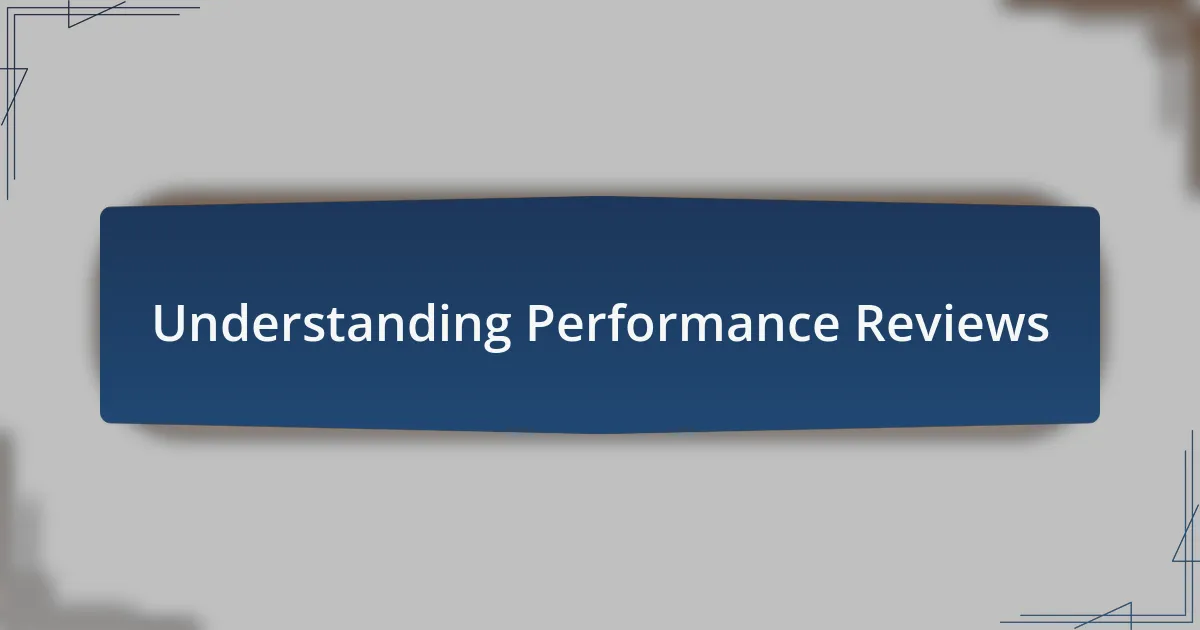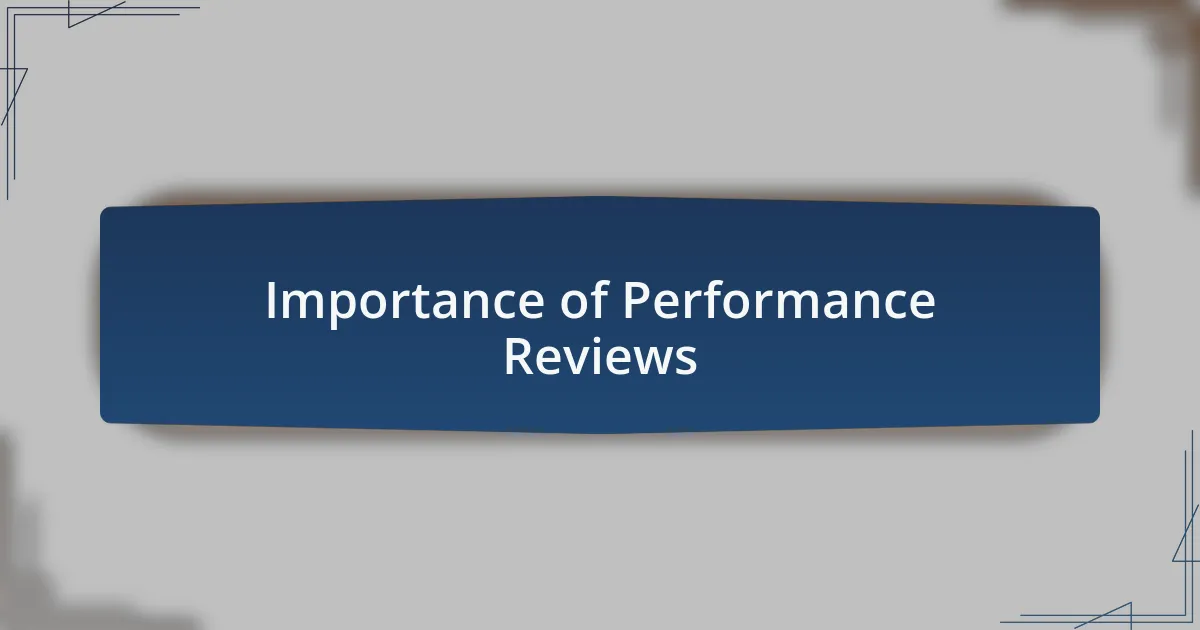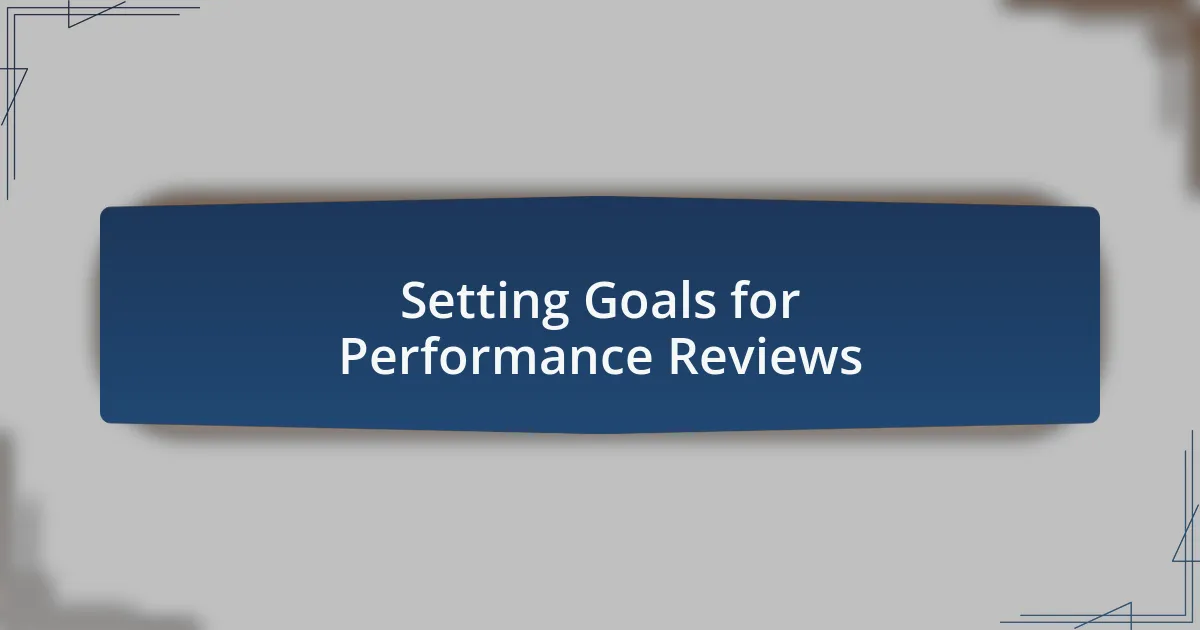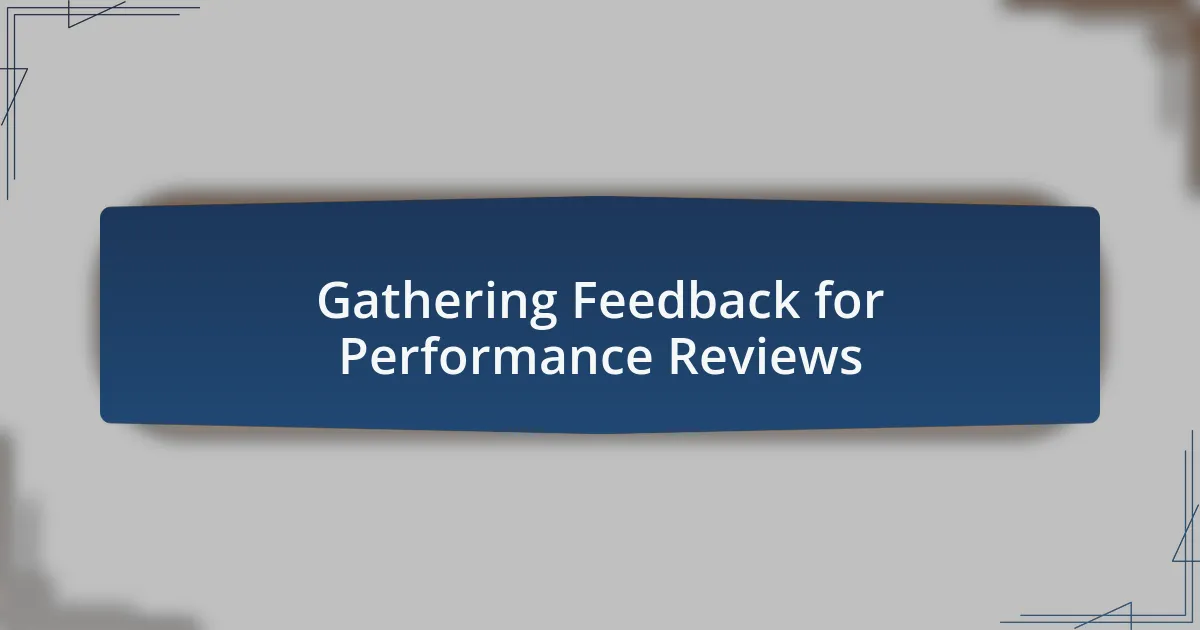Key takeaways:
- Embrace performance reviews as two-way conversations for active participation in personal development.
- Preparation is crucial; gather accomplishments, anticipate feedback, and practice self-reflection to enhance outcomes.
- Setting clear, measurable goals and involving managers in the process fosters collaboration and aligns aspirations.
- Regular feedback collection from peers and self-assessment promotes continuous growth and improvement.

Understanding Performance Reviews
Performance reviews often carry a weight of anticipation—will they affirm your efforts or highlight areas for improvement? I vividly remember my first review; I entered the meeting room excited yet nervous. The feedback was a blend of praise and constructive criticism, offering insights that ultimately helped shape my professional growth.
Understanding the process behind performance reviews is crucial. I’ve found that embracing them as opportunities rather than evaluations helps ease anxiety. It raises the question: how can we genuinely learn from these discussions? When I began actively listening during my reviews, I started recognizing patterns in my work habits that needed adjusting, making me more receptive to feedback.
It’s essential to see performance reviews as two-way conversations. I once had a supervisor who encouraged me to share my own perspectives and accomplishments, which transformed the dynamic. Suddenly, I was not just the recipient of feedback but an active participant, allowing me to engage deeply with my development and goals. Have you thought about how your input could change the outcome of a performance review?

Importance of Performance Reviews
Performance reviews play a pivotal role in fostering employee development. I’ve seen firsthand how constructive feedback can shine a light on skills I wasn’t even aware needed improvement. I remember receiving comments about my time management during one review; it was an eye-opener that motivated me to adopt new strategies, ultimately enhancing my productivity.
They are not just about the employer’s perspective but also provide a structured moment for self-reflection. I once used my review to assess my own achievements and align future goals with my company’s mission. This thoughtful approach led to a more meaningful discussion, making me feel valued and understood—has that ever happened to you during a review?
Moreover, performance reviews serve as a benchmark for career progression. I recall a colleague who used feedback from their review to negotiate a promotion. It inspired me to realize that performance discussions could be stepping stones toward personal and professional aspirations. How might your next review influence where you see yourself a few years down the line?

Preparing for Performance Reviews
Preparing for performance reviews is an essential step that I believe can make a significant difference in the outcome of the meeting. From my experience, I always take the time to gather my accomplishments and any feedback I’ve received throughout the year. For instance, I once organized my successful projects into a concise summary that not only helped me recall my achievements but also allowed me to present them effectively, ensuring nothing I had done went unrecognized.
Another strategy I find invaluable is anticipating the feedback I might receive. Reflecting on my past performance and being honest with myself about areas needing improvement sets a positive tone. I remember walking into one review feeling apprehensive about my communication skills—something I had been working on. When my manager acknowledged my progress but also pointed out areas for further growth, it felt like a partnership in my development rather than a critique. Have you ever considered how self-awareness can shape your review outcomes?
Preparing questions in advance is crucial, too. I’ve learned that turning the conversation back to the reviewer can provide invaluable insights into how I can align my goals with the company’s vision. In one memorable review, I asked about career development opportunities, which opened up a dialogue about mentorship and professional growth that enriched my experience and provided a clear direction for my future. How prepared are you to take control of your own narrative during your next performance review?

Setting Goals for Performance Reviews
Setting clear goals for performance reviews is crucial. I once set a specific objective to improve my project management skills after receiving feedback on my time management. This goal not only gave me a clear focus for the year but also made my efforts measurable. I tracked my progress, ultimately leading to a successful project launch that I proudly highlighted in my review.
I’ve found that involving my manager in goal-setting can create a collaborative atmosphere. During my last review, I proposed a goal to lead a team initiative, framing it as a way to enhance both my leadership skills and contribute to team dynamics. This approach invited my manager to provide input, making the goal feel like a shared journey rather than something isolated.
Lastly, I believe it’s vital to be flexible with your goals. Sometimes, what seems important at the start of the year shifts as projects evolve. A few months ago, I realized that the emerging challenges of working remotely required me to adapt my goals around collaboration and communication tools. How often have you re-evaluated your own goals throughout the year to align with changing priorities?

Gathering Feedback for Performance Reviews
Gathering feedback for performance reviews is a proactive step that I find can truly shape my growth. During a previous review, I reached out to colleagues for their insights, and one team member shared how my communication style impacted the project. This feedback helped me realize the importance of not just speaking but also ensuring everyone’s voice is heard. Have you ever thought about how much valuable insight can come from your peers?
I also encourage informal check-ins throughout the year to gather ongoing feedback. I remember discussing my presentation skills with a few trusted coworkers after a major project pitch. Their thoughts not only helped me refine that skill but also made me feel more connected to the team. Regular feedback can be the bridge that carries us toward our ultimate goals together, don’t you think?
Lastly, don’t underestimate the power of self-reflection as part of gathering feedback. After each project, I take a moment to jot down what I believe worked well and what didn’t. This practice ensures that when it’s time for my performance review, I’m not just relying on others’ perspectives but also bringing my insights to the table. Have you tried self-reflecting to enhance your feedback collection?

Practicing for Performance Reviews
Practicing for performance reviews can feel daunting, but I’ve found it to be a crucial part of my preparation. I like to role-play potential scenarios with a friend or mentor, where I carefully articulate my achievements and areas for improvement. It’s fascinating how many insights I gain from hearing my own words out loud—sometimes, it reveals strengths or concerns I hadn’t fully acknowledged. Have you ever tried voicing your thoughts in a mock review?
Another strategy I use is to simulate questions that my manager might ask. For instance, during one preparation session, I anticipated tough questions about a project that didn’t go as planned. By thinking through my responses, I was able to approach the real review with confidence, presenting solutions rather than just problems. This approach often transforms fear into empowerment. What would you say if faced with tough questions?
In my experience, recording myself during these practice sessions has been incredibly enlightening. Listening back not only helps me refine my delivery but also reveals body language cues I can improve on. It’s an interesting mix of self-evaluation and improvement. Have you considered how the way you present yourself can impact the overall message?

Reflecting on Performance Review Outcomes
Reflecting on the outcomes of performance reviews is an eye-opening experience for me. After every review, I spend some time jotting down key takeaways, such as the feedback I received and my performance highlights. It’s surprising how often those reflections reveal patterns or themes that I might not have noticed in the moment. Have you ever paused to analyze the feedback you’ve received?
One time, I received constructive criticism on my project management skills, which initially felt discouraging. However, as I reflected further, I recognized it as an opportunity for growth. By focusing on actionable steps, such as seeking mentorship and enrolling in workshops, I shifted my perspective from disappointment to excitement about improvement. What changes have you made after receiving feedback?
I realized that reflecting on the review outcomes isn’t just about assessing my performance, but also about understanding my emotional reactions. I often felt a mix of pride and anxiety during reviews, which tells me a lot about my goals and values. Unpacking these emotions helps me set more meaningful objectives for the future. Have you ever considered what your feelings reveal about your professional journey?